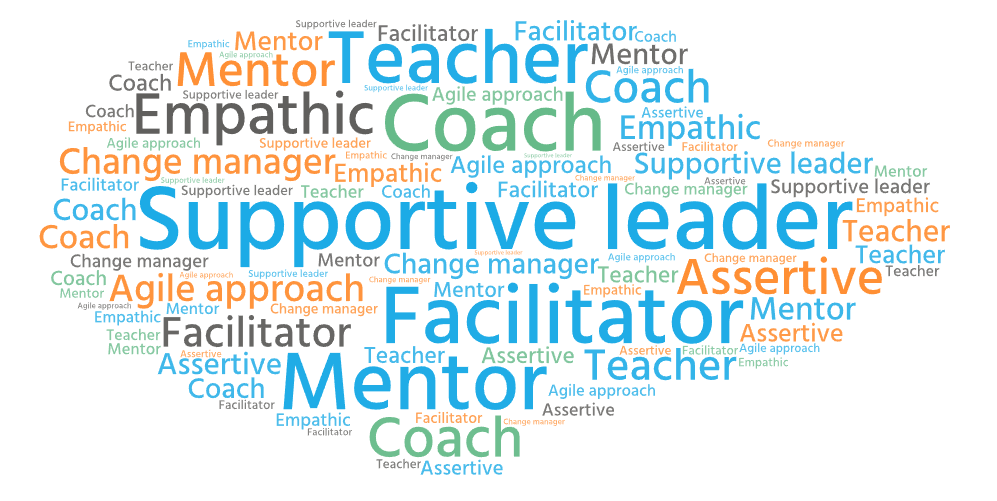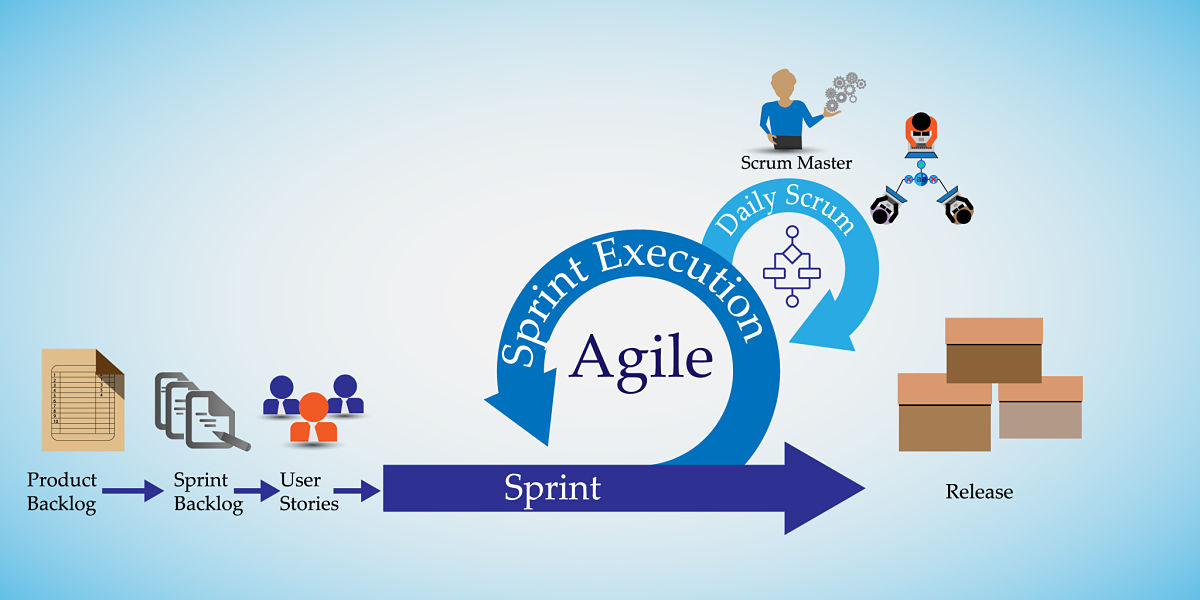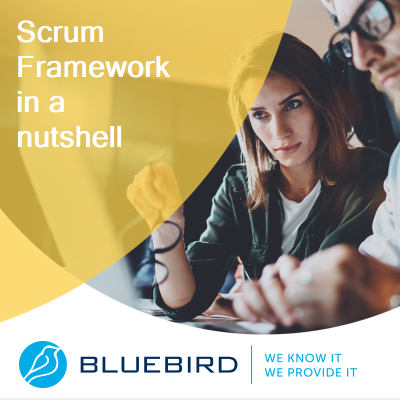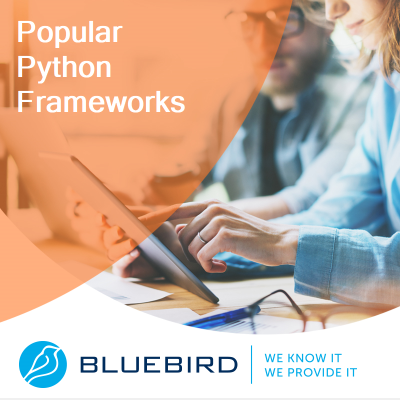What tasks does a Scrum Master do and how much does he/she earn? Find out all about the Scrum Master job at Bluebird!
More...
Scrum Master Roles and Responsibilities
A Scrum Master has many tasks during a project. Basically, his job is to ensure that the agile principles are followed by the team and to manage the mechanisms defined by the Scrum framework (participating in daily standups, demos, and retrospectives, helping to plan sprints and fine-tune the backlog, etc.). In doing so, he helps the team overcome difficulties, gives direction to the members when needed, and thus avoids difficulties that could jeopardize the success of the project.
The Scrum Master is responsible for the day-to-day support of the Scrum team. His/her tasks are very similar to those of a coach or trainer. It is completely different from the tasks and responsibilities of a traditional project manager. This is because the self-organizing development team does not require management, tasks are not assigned because the team selects them from the backlog.
The role of the Scrum Master is to maximize value addition by educating all internal and external members involved in the project and facilitating interactions between the product owner, the development team, and the organization. He is responsible, for example, for ensuring that mandatory events take place during the sprint and do not exceed the time available.
This also shows that the Scrum Master needs to have a wide range of different skills and knowledge. He is at the same time an agile expert, consultant, project manager, coach, mentor, or, if necessary, a spiritual garbage collector.
As the soul of agile is good teamwork, he has to ensure it. If tension arises, he or she will resolve it, either in a one-to-one or in a group discussion. He holds a mirror up to the team, focuses their attention on their performance, and encourages them to keep improving. If he notices slackness, if goals are in jeopardy, he gets them going again.
Since he has no formal power to do this (everyone is equal in the team!), he can only influence others through the strength of his personality, his professional credibility, and his authority. He cannot give instructions: he must convince the team members that his decisions are right and serve the common goal.
Scrum Master Tasks in Detail

Skills and Competencies Needed
Teaching and coaching skills
A significant part of the Scrum Master's job is to help everyone on the team understand and work with the Agile approach. As a result, the Scrum Master needs excellent teaching skills, especially for teams that are new to the Scrum framework. A great Scrum Master not only needs to know what to do, but also needs to be able to explain it to all members involved.
Supportive leadership approach
A supportive leader is driven by a passion for supporting the team. This approach is in stark contrast to the usual leadership style, which seeks to control and lead. The Scrum Master supports the team's goals and helps them to develop and succeed. A Scrum Master demonstrates ethical and caring behavior, puts the needs of others first, and increases clarity and transparency.
Communication skills
The typical communication approach of people is to compete, judge, demand, and diagnose. The Scrum Master practices and teaches non-violent communication to the team. A good Scrum Master prefers dialogue to monologue, listens to the feelings of others, does not become personally involved, and doesn't criticize.
Facilitator skills
Being an excellent facilitator means making things easier and more achievable. This includes helping the scrum team work together, for example during a meeting, change, or decision-making process. An excellent scrum master is reliable, objective, and neutral.

Scrum Master Certifications
CSM
Certified Scrum Master
The Scrum Alliance organization provides this certification. It is the most widely used certification and is recommended for anyone who wants to work as a Scrum Master.
The total cost of the course and exam is around $500-1000. The certification can be obtained by simply attending the course and passing the exam.
PSM I
Professional Scrum Master I
Scrum certification offered by Scrum.org, an organization founded by Ken Schwaber, one of the co-creators of the Scrum Alliance.
PSM I is the first part of a three-part course (PSM II, PSM III).
The cost of the course is $150. To become certified, you must pass the PSM I assessment. Participation in the course is not compulsory.
CSP
Certified Scrum Professional
It is the highest level of Scrum certification in product development. This certification is of interest to developers.
The prerequisites for this certification are an active CSD certification, at least 36 months of Agile or Scrum work experience in the last 5 years, and at least 70 hours of Scrum training in the last 3 years.
Cost: $100 application fee plus $150 certification fee.
SSM
SAFe Scrum Master
The SAFe Scrum Master certification can be useful in working environments where development is done according to Agile, Lean, or DevOps concepts. Certification is provided by Scaled Agile, the organiorganizationsation that oversees the Scaled Agile Framework (SAFe).
The cost of the course and exam together ranges from $600 to $1200. A prerequisite for the exam is a two-day Scaled Agile-approved course.
CSD
Certified Scrum Developer
This certification is useful for product developers working in a Scrum environment. This certification is a prerequisite for the Certified Scrum Professional (CSP) certification, but also for the Advanced Certified Scrum Developer (ACSD) certification.
To obtain the certification, you must complete a CSD course of at least two days. The cost is around $1000.
What Makes a Good Scrum Master?
Professional Background
Professional knowledge and experience are necessary, but not enough to make a good Scrum Master. You don't have to be the best developer or tester in, the team, but you should have the skills to understand the problems, assess their severity, and propose solutions.
However, in addition to the technical side, human qualities are just as important. You need to be able to build a good rapport with your team members. You cannot be biased: team members must be aware not only of your strengths but also of your weaknesses. Be patient and understanding, but also determined to bring out the best in everyone, so that individuals with good skills can form a truly effective team!
Experience
I have presented Scrum certification courses previously. However, even a comprehensive understanding of the Agile methodology is insufficient preparation for the vast array of responsibilities required by this position. A few years of experience in an agile environment is essential for understanding the Scrum framework from the inside, through practice.
Some life experiences should also not be considered negative. Empathy, conflict management skills, leadership techniques, and motivational drivers are more valuable than youth and vigor when it comes to building a team comprised of individuals with diverse personalities and backgrounds. Moreover, as in all areas of IT, continuous education, self-training, and growth are essential.

Scrum Master Interview Questions
Our blog about Scrum Master interview questions offers a comprehensive list of handy interview questions. These questions are designed to evaluate a candidate's understanding of Scrum principles, their ability to facilitate team collaboration, and their problem-solving capabilities. Additionally, the questions cover a range of topics such as servant leadership, conflict resolution, and continuous improvement. By reviewing these questions, Scrum Master candidates can better prepare for their interviews and increase their chances of securing the role.
Scrum Master Salary
The complexity of the job makes the Scrum Master one of the better-paid people in the IT world.
According to the Bluebird IT Salary Guide:
Do you require a Scrum Master? Hire Scrum Master from Bluebird for a daily fee!
Scrum Master: Out or in?
There is no consensus regarding whether it is preferable for the Scrum Master to be a member of the development team (such as a developer or a senior member) or an outsider.
In the first scenario, he lives with the team, comprehends problems better, and is intimately familiar with the project and code under development. The disadvantage is that the developer's (or tester's) work may conflict with the Scrum Master's team-wide responsibilities.
A full-time Scrum Master is unquestionably an added expense; this can be somewhat reduced by having him/her work on multiple teams concurrently; however, this may compromise his/her effectiveness.
The solution could consist of the Scrum Master is a member of the team, but only participating in the actual development when he is not serving in his Scrum Master role.



